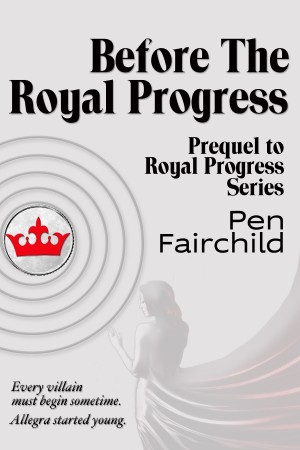Interview with Pen Fairchild
Published 2015-11-30.
Describe your desk
I write quickly and in big bursts where I'm glued to my work station for hours at the time, and it's disruptive to have anything interrupt that activity flow. For that reason, my actual work setup is both basic and highly organized. Truthfully, my desk is the most organized thing about me. My iMac sits on top of a drawer big enough to hold batteries for the mouse, a ruler, a weight to hold reference books open, throat lozenges, and the tinted glasses I wear to reduce glare from the computer screen. On one side of my computer stand is a small bookcase-cum-reading platform where I keep reference books I find more convenient to use in print form. On the other side of the computer stand is a work shelf holding an Epson scanner and iPad and Fire on stands. The scanner is there because, as an amateur artist, I enjoy playing with graphics when I want a break from work.
What is your writing process?
I always know where I'm going, but I let the situations and the characters that develop within them tell me how to get there.
What is the greatest joy of writing for you?
The act itself is fun. I never begin writing without a rush of pure pleasure. What can be more fun than expression of a creative urge?
When did you first start writing?
When I was four. I wrote a one-page story about my cat Pywicket.
Where did you grow up, and how did this influence your writing?
I grew up partly in the UK and partly in the U.S., living in university towns both places. Listening to a lot of smart people argue about Utopias fascinated me. Is it possible to create an ideal organization model that truly works for everyone in a society and not just for the elite who designed it and those whose interests they favor? How flexible must a one-idea system be in order to survive, and is the need for flexibility a symptom of decline? Is the desire for Utopia really more about psychological housekeeping than intellectual commitment - are we so desperate to lead less-messy lives that we'll accept a relative loss of possibility as a tradeoff? For me, this became an issue of how such ambiguities play out on an individual basis, especially for a member of the leading elite who disagrees with many of the basic premises of the very system that benefits her? Which was what led me to Princess Bettina and "the boys".
What are you working on next?
The second book in the Royal Progress Series. It's called Outlands Crusade, and it follows Princess Bettina and "the boys" back into the wild and dangerous Outlands to rescue survivors of the ill-fated Royal Progress.
How do you approach cover design?
The publisher is responsible for this, but I pass along my ideas, some of which get noticed, some of which do not. It's a give and take process in which inevitably the publisher has the final word. I have relatives who are authors, and this seems to be the area about which they feel the most frustration. It's hard to encapsulate the sense and mood of a book in one image, whether symbolic or literal.
What do your fans mean to you?
As I'm new, I don't have any yet. I'm hoping they'll mean everything! Validation, reinforcement, inspiration - everything.
Who are your favorite authors?
Brilliant question, but hard to answer because I am a reading addict and I'm always discovering someone who's new to me. Some, of course, are long-term and perpetual, like Agatha Christie and Josephine Tey. Others are more recent, like Tan Twan Eng and Emily St. John Mandel. I must confess a special weakness for Georgette Heyer, a particular favorite of my grandmother's, who introduced me to her form of light but satisfying romance. And I think I must be the last person on the planet to happen on Diana Gabaldon's Outlander Series, which I found totally entertaining. I'm afraid there isn't a definitive, final answer.
When you're not writing, how do you spend your time?
I am a nonstop reader, and I enjoy painting and messing about with computer graphics.
What do you read for pleasure?
Mysteries, dystopian fiction, nonfiction history, memoir/biography, humor. Pretty much anything that catches my eye, but those are the most likely.
How do you discover the ebooks you read?
Reviews in magazines, BookBub listings, author interviews in magazines and newspapers, displays of similar books when I've bought or looked at an ebook listing online, and occasionally my parents or a friend will gift me with an ebook they think I'll enjoy or find useful.
What inspires you to get out of bed each day?
I wake up thinking about what I want to write. Then I realize I'm perishing for a cup of tea and a biscuit.
Smashwords Interviews are created by the profiled author or publisher.
Books by This Author
Before the Royal Progress: Prequel to Royal Progress Series
by Pen Fairchild
Hautland 729 years from now. A perfect domain, a clueless leadership, a handsome ruler and a doomed first wife, a personal tragedy, and an ambitious second wife. The dangerous combination that set the stage for the catastrophic Royal Progress fourteen years later. This 3,900-word narrative is the prequel to the Royal Progress Series.

